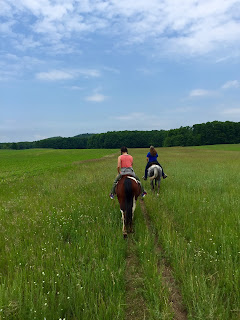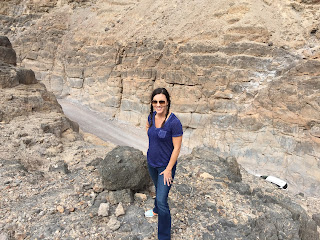At the age of 6, my dad allowed me to ride my first horse in Roundup, Montana. This old gentle grey Appaloosa graciously accepted my unbound enthusiasm and newfound confidence. Since that day, I’ve had a meaningful connection to and appreciation for horses. While growing up, I spent a great deal of time riding, caring for, and learning from them.
This particular photo of me inspired me to reflect upon the interconnectivity among our lived experiences, learning, leading, and succeeding.
This particular photo of me inspired me to reflect upon the interconnectivity among our lived experiences, learning, leading, and succeeding.
Getting Back on the Horse
When I was 10 years old, I rode Sammy down our dirt road to the neighbor’s home which was about a mile away. Sammy was a very young horse and only green broke – he was just beginning to be able to accept riders on his back. My dad was coaching me carefully as he rode next to me, as green broke horses can be jumpy and unpredictable. Sammy did great! Until…
The neighbor’s dog (old ornery dog named Keen!) nipped at Sammy’s back heels, which caused him to immediately shoot straight into the air on all fours, then proceed into a running and bucking frenzy. After about three jumps, I fell off and landed pretty hard on my right elbow. I was probably more scared than hurt at that point. Despite the tears and having the wind knocked out of me, my dad taught me an incredibly valuable leadership lesson through five simple words – “get back on the horse.”
In the Saddle Again
It was a wonderful character building moment for me – learning the discipline of accepting and pushing through painful, difficult, ambiguous, or stressful times. This core characteristic served me well in the military, throughout my career, and in the face of personal adversity.
As a rider, it was also my obligation to teach the horse a lesson. His bad behavior was given no special attention - he was not rewarded. In addition, I showed him I was not afraid of him (horses are keenly aware of fear and will use it to misbehave).
Scanning Your Environment
One of the most fundamental skills of riding a horse is staying alert and paying attention to the overall environment. Is it windy? Are storm clouds forming? Are there other animals around? What are the horse’s ears telling you? That’s right! His ear positioning provides valuable intel about the environment. Each unique position tells you if he is relaxed, sees something, hears a noise, or is getting ready to misbehave (e.g. bite another horse, buck, or kick).
Continuously scanning your environment keeps you safe and thriving. The same is true for industry. Market scanning is continuously analyzing the external market to gain critical insights about the following:
- Market needs and new market opportunities
- What your competitors are doing
- Proactive strategies
- Value-added technology and innovation
Businesses and organizations should pay close attention to external forces, and should look to other industries for insights, ideas, and strategies. In higher education, institutions gravitate towards other institutions with a similar size, scope, and mission for insights, learning, and bench marking.
Imagine the possibilities if institutions put more effort into learning from institutions different from their own, or from the business, healthcare or government sectors. Diversity of thought and perspective sparks creativity, momentum, and success.
Leading With Humor
When you think of a horse what’s the first thing that comes to mind? Perhaps it’s strength, endurance, or unbridled freedom. Did you know they have an intrinsic sense of humor? They find ways, sometimes mischievous ways, to intentionally draw their riders and caregivers into their humor.
Do you find ways to effectively draw others in through the use of humor in the workplace? Effective use of humor can relieve stress, improve morale, change the tone of the entire room, and spur creativity. Of course, the right setting, timing, cadence, and delivery matters. It takes practice. When you find others who use humor well, pay attention to the contextual details so you can sharpen your skills.

Happy Trails
Know that your toes are going to get stepped on at some point. You may fall down or get kicked around. Your ego may get bruised. Yet this fact remains true: we are in control because we have the freedom to choose how we respond.
One way to build resiliency is to find the things, activities, and people who bring us the greatest joy. Place a renewed focus upon these.
Trail riding is one of the most calming and uplifting experiences. Give it a try! You come away feeling peaceful, and closely connected to the horse and mother earth.
Nicole Schultheis is an innovative executive in higher education hailed by institutions as “Collaborative…Forward Thinking…a Thought Leader.” With more than 20 years of leadership experience at large research universities and the U.S. Army, and a Ph.D. from Saint Louis University, Schultheis is known for her leadership in student success, organizational effectiveness, information technology, and enrollment services. When Schultheis is not being a very busy and sought after administrator, she enjoys traveling, exercising, and experiencing nature.
One way to build resiliency is to find the things, activities, and people who bring us the greatest joy. Place a renewed focus upon these.
Trail riding is one of the most calming and uplifting experiences. Give it a try! You come away feeling peaceful, and closely connected to the horse and mother earth.
Happy trails to you now and always.
Nicole Schultheis is an innovative executive in higher education hailed by institutions as “Collaborative…Forward Thinking…a Thought Leader.” With more than 20 years of leadership experience at large research universities and the U.S. Army, and a Ph.D. from Saint Louis University, Schultheis is known for her leadership in student success, organizational effectiveness, information technology, and enrollment services. When Schultheis is not being a very busy and sought after administrator, she enjoys traveling, exercising, and experiencing nature.




